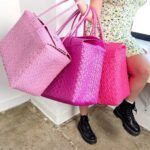Part of Downtown Chula Vista, Daisy Romero recently opened her first brick and mortar business on Third Avenue in October 2023, offering a wide selection of artisan-made hand bags that blend timeless traditions and a modern aesthetic that is both stylish and functional. Each bag is hand-made by skilled artisans in Mexico using traditional techniques transforming recycled plastics into works of arts.
El Cholo’s Kid opened as an online store in 2008. Romero, a border child constantly going back and forth between Mexico and California, developed admiration for Mexican artisans, igniting her passion to showcase their talents in the U.S.

Romero said she has always loved artisanal handmade items, something she learned early as her family traveled a lot and she is a first generation Mexican-American.
“When I was young, I traveled all throughout Mexico with my parents,” she said. “I have had my own workshops since 2014. Originally it started with more handmade goods and working with many different types of artisans. Since I only had an online store, I started focusing on bags. It was a matter that the bags were so beautiful, easy to ship, and it was easier for me to sell online.”
Romero said she has always had a passion for showing parts of Mexican culture to a new audience.
“These are traditionally Mexican handmade bags, but I do traditionally have a younger audience, and people who did not grow up with these types of bags,” she said. “Especially now, being on Third Avenue, people come in and say that they remember this style of bags and love them, and do not have to go to Mexico to get a handmade artisanal thing. That is the idea behind my brand, keeping artisanal work alive.”
Romero said she has always loved these bags with the element of using recycled plastics,” she said. “Artisans have always used recycled items to create. Water bottles that are turned into the material to weave. Other people use palm trees, plastic bags turned into weaving material. Artisans in Mexico have always used things from disposal to create art. It has always been a traditional art. It is part of our culture to reuse. I love that it is sustainable, and you do not have to keep buying bags at the grocery store. The actual art of weaving is what I really love. And the colors and everything that goes into the end product.”
Romero said it is hard to tell that these bags are made from recycled materials, and that the weaving process is different for many of the bags, reflecting different regions of Mexico.
“In Oaxaca, Mexico the weaving is similar with recycled plastic, but it might be different symbols on them. In Central America, there are similar types of bags, but it is the artisanal differences that make the bags different from other regions. This is what I really love in the artisanal world,” she said.
Romero said she has been working with the same family since 2014 for the creation of her products.
“I found them and ended up at their house. They were weaving similar bags, and I would tell them all the changes that I wanted,” she said. “Normally when I work with artisans, especially when I was working with many artisans, I would just go to the towns I knew. This town is famous for making pottery. This town is famous for weaving. Or embroidering flowers. There are certain communities that you know what they make. And this all goes back to my travelling. Meeting these people, going to their homes, seeing their manufacturing, makes it more about becoming part of their community. It is a lot of forging relationships. This blended in with my love of travelling and the making of artisanal things. And I love the cultural aspect of it.”
Romero said although she does not weave the bags herself, they are one-of-a kinds that can only be purchased through her business as she has built this organic relationship with a family of weavers to create her products.
Romero said El Cholo is her father’s nickname, so when she would go back to his neighborhood, they would call her El Cholo’s Kid, now the name of the store.


![El-Cholo_s-Kid---Portraits---11[1]](https://www.thestarnews.com/wp-content/uploads/2024/03/El-Cholo_s-Kid-Portraits-111-696x870.jpg)












